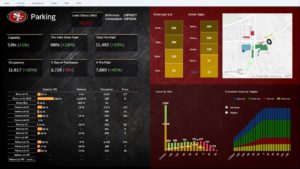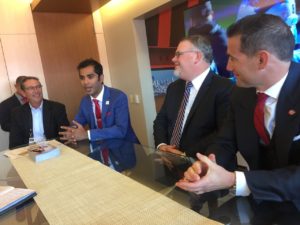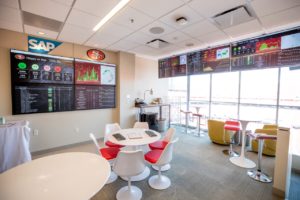
A sample screen shot from the new Executive Huddle stadium operations management platform, developed by SAP for the San Francisco 49ers. Credit: San Francisco 49ers (click on any photo for a larger image)
In use at the Niners’ Levi’s Stadium since the start of the current football season, Executive Huddle brings transaction information from nine different stadium operations systems, including parking, concessions, retail sales, weather and fan opinions into a visual output that allows team executives to make real-time decisions on how to fix problems or otherwise enhance the game-day experience.
Demonstrated at Sunday’s home game against the Los Angeles Rams, the software not only reports raw data like concession sales or parking lot entries, but also provides a layer of instant feedback to let team executives make immediate changes to operations if necessary. The cloud-based application, developed by SAP and Nimbl, is currently only in use at one upper-level suite at Levi’s Stadium, where the output runs during Niners’ game days on several video screens. SAP, however, plans to make the system available to other teams in the future, according to SAP executives at Sunday’s demonstration.
Fixing issues in real time
Al Guido, president of the 49ers, said Executive Huddle was the end product of a desire of his to be able to fix any game-day experiences on the day of the game, instead of in the days or weeks after. According to Guido, the Niners have been passionate about collecting fan-experience data since Levi’s Stadium opened in 2014. But in the past, the compilation of game-day data usually wasn’t complete until a day or two after each event, meaning any issues exposed were only learned lessons that needed to wait until the next games to be fixed.

Executives huddle: from left, SAP’s Mark Lehew, Niners’ Moon Javaid, SAP’s Mike Flannagan and Niners president Al Guido talk about the Executive Huddle system at a Sunday press event at Levi’s Stadium. Credit: Paul Kapustka, MSR
“I really wanted to be able to act on it [the operations data] in real time, instead of waiting until the Wednesday after a Sunday game,” Guido said.
Now, with Executive Huddle, the Niners’ operations team can sit in a single room and watch as operations events take place, and can make in-game moves to fix things, like calling on the radio to a parking lot to tell gate operators of traffic issues.
“It’s like having an air traffic control system,” said Mark Lehew, global vice president for sports and entertainment industry solutions at SAP. Lehew said SAP worked with the Niners’ list of operations vendors, including Ticketmaster, ParkHub, caterer Levy and point-of-sale technology provider Micros to provide back-end application links so that Executive Huddle could draw information from each separate system into the uber-operations view that Executive Huddle provides. According to SAP, Executive Huddle is based on SAP’s Leonardo and Analytics platform.
The manager of managers
Though the system doesn’t currently monitor some other key stadium operations information, like performance of the Levi’s Stadium Wi-Fi network, Michael Pytel, chief innovation officer for Nimbl, said the system could conceivably add “any information we can get from an API.”

The Levi’s Stadium suite where the Niners monitor Executive Huddle information. Credit: San Francisco 49ers
Javaid, the quarterback of the program’s development from the Niners’ side of the equation, noted that part of its power comes not just from surfacing the data, but also from providing some instant intuitive markers — like red for declining metrics and green for positive — and the ability to compare current data to those from other events so that data could not just be seen but also understood, within seconds.
And while SAP plans to make Executive Huddle available to other teams, it’s clear that the program — as well as education and training for the decision-making staff who will use it — will need different care and feeding for each stadium that might want to use it. But SAP’s Lehew noted that being able to provide real-time data in an exposed fashion was becoming table stakes for operations providers, who would have to move past old ways of doing things if they wanted to be a part of the next generation of stadium service providers.






